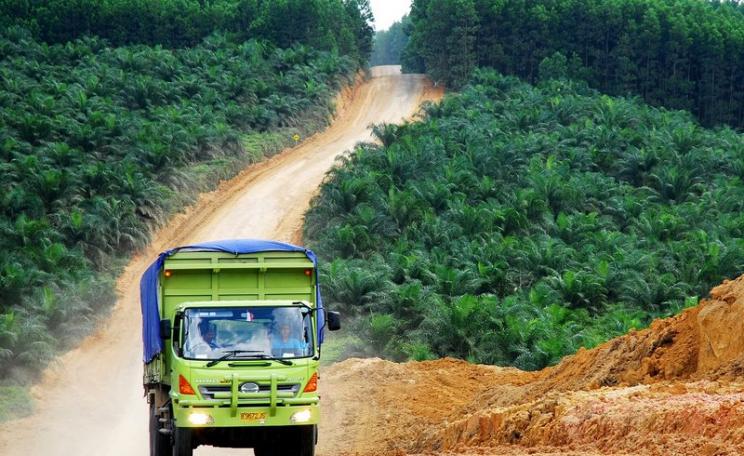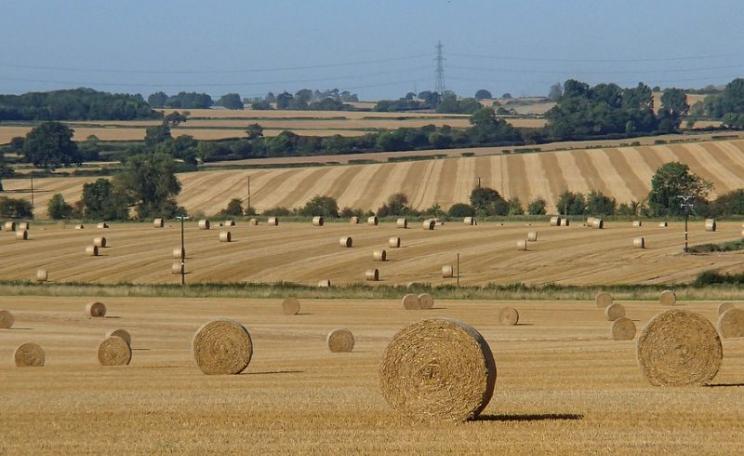Why should we agree to the expansion of the farm if we can smell it near Ladyzhyn every day? We want investments and development to bring us closer to civilisation. But we want an investor who will not pollute our water, air and land.
Business is booming in Ukraine - agribusiness, that is. Agriculture was the only sector of the economy to grow in 2014, and it remains a source of much-needed foreign reserves.
A free trade agreement signed with the EU in 2014 has assured Ukraine access to European markets for its food producers.
And not surprisingly, investors are queuing to access Ukraine's nearly 32 million hectares of arable land, equivalent to roughly one third of all arable land in the EU.
The country's single largest investor, the London-based European Bank for Reconstruction and Development (EBRD), has said that any new investments in Ukraine would be conditioned on reforms and a crackdown on the graft that has continued to run rampant since the Maidan protests erupted in 2013.
But the reforms pursued by the EBRD and other public investors like the World Bank and the European Investment Bank (EIB) may result in the wholesale suspension of regulation in the agricultural sector and increased instances of land grabbing - leading to a push back from rural communities that find themselves marginalised by massive, foul-smelling agro-industrial complexes.
Feeding the poor? Or enriching Ukraine's oligarchs?
A report released yesterday details how investments by these banks into one of Ukraine's largest poultry producers, Mironivski Hliboproduct (MHP), have not only swept rural Ukrainians under the rug, but have also lined the pockets of one of the country's richest oligarchs.
At 380,000 hectares, MHP has one of the largest land banks in Ukraine, and has benefited from more than €500 million in loans from the EBRD, the World Bank and the EIB. Ukraine's fifth richest man and MHP founder Yuriy Kosyuk (see photo) owns more than two-thirds of the company.
Kosyuk's influence on national politics is significant. Once the right hand man to the country's billionaire president, in 2014, he and eight others were estimated to control nearly 6% of the country's GDP.
Because poultry produced in Ukraine is now the cheapest in the world, the EBRD has placed a premium on this sector of the economy, and argued that the country has the unrealised potential to help feed the world and its poor.
Why should we agree to the expansion of the farm if we can smell it near Ladyzhyn every day? We want investments and development to bring us closer to civilisation. But we want an investor who will not pollute our water, air and land.
To this end, MHP had used a part of these loans to build its Vinnytsia poultry complex in southwestern Ukraine, the largest of its kind in Europe, and is now undertaking an expansion to double its size.
Conditions placed on the loans by its lenders require MHP to implement a number of health, safety and environmental improvements, which the company has said repeatedly will follow best international practices.
But locals argue that the company has not honoured its commitments. A visit to the site in May 2015 documented in the report observed that the project's first phase has led to increased road traffic, noise pollution, and road safety risks, as well as a foul odour that engulfs the villages.
Big stink
As one woman interviewed in the nearby village of Bilousivka puts it, "Why should we agree to the expansion of the farm if we can smell it near Ladyzhyn every day?"
MHP has argued that it is building "long-term relations with locals, providing them with legal support and advice regarding lease agreements (usually higher than on the market - in money and in kind) and social support."
This because a moratorium has been placed on the sale of land in Ukraine, so MHP needs to secure its expansion by leasing plots from local landowners.
However, a number of locals refute this, alleging that they've been pressured by MHP to lease their lands, despite not wanting to be surrounded by chicken rearing houses. They consider it their responsibility to prevent the pollution of their highly fertile soil. Land grabs thus are less about buying the land than outright control of it.
The EBRD hosted an event this week at its Liverpool Street headquarters to bring together investors and decision-makers to secure financing for Ukraine's agribusiness sector. But the bank and other lenders must balance their agribusiness focus with a genuine view of the deep reforms that can lead Ukraine's sustainable development and respect the will of its locals.
Though she won't be in attendance, the woman from Bilousivka said it best: "We want investments and development to bring us closer to civilisation. But we want an investor who will not pollute our water, air and land."
The report: 'Black earth - Agribusiness in Ukraine and the marginalisation of rural communities' is published by CEE Bankwatch.
Fidanka Bacheva-McGrath is EBRD co-ordinator for CEE Bankwatch Network, which monitors public investments in Central and Eastern Europe, and promotes sustainable alternatives.
This article was originally published by Euractiv and is reproduced by kind permission.




